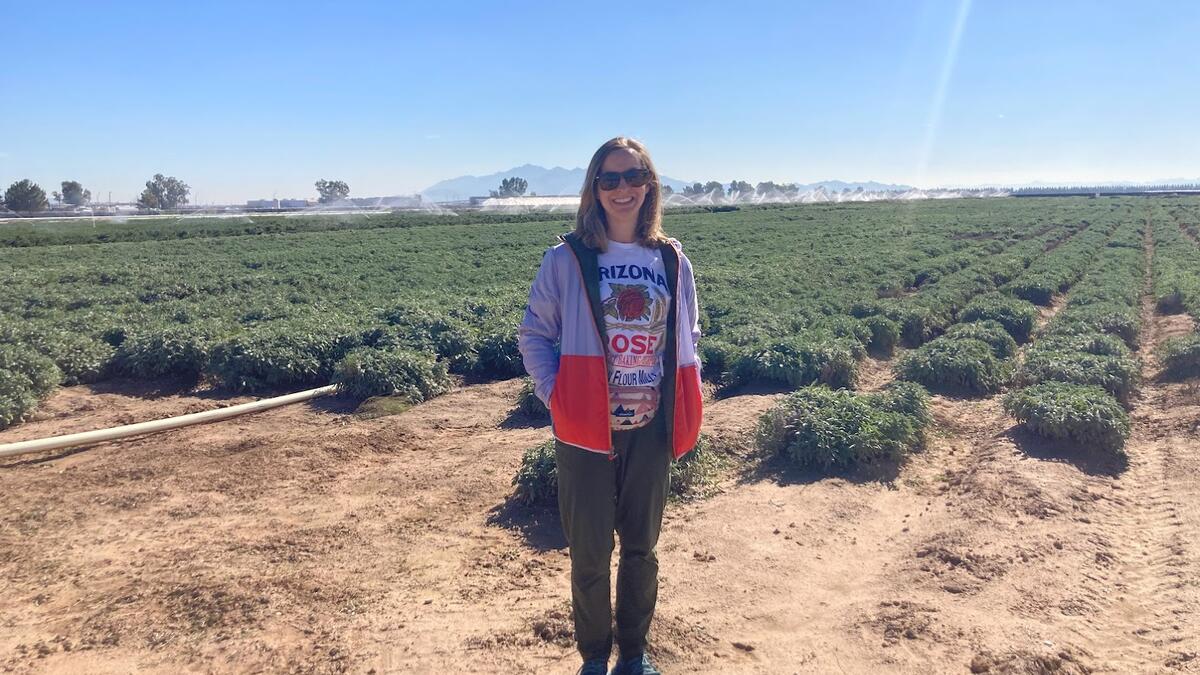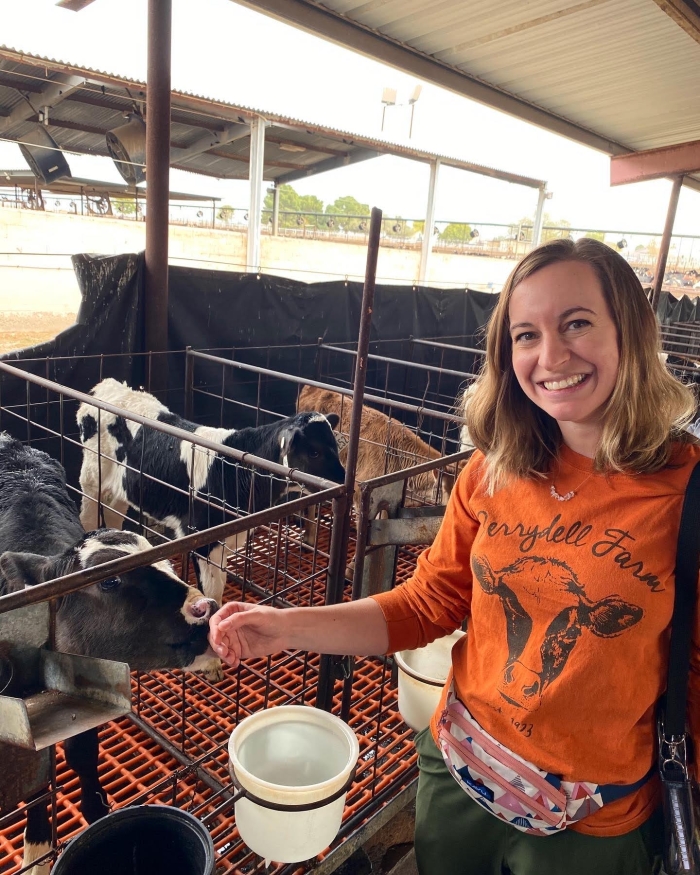ASU sustainable food systems grad is a leader in food advocacy

Elizabeth Reilly is graduating this May with a Master of Science in sustainable food systems and a certificate in food policy and sustainability leadership from the College of Global Futures. Above: Reilly visited Arizona’s Duncan Family farm as parts of the program’s immersive experience.
Editor’s note: This story is part of a series of profiles of notable spring 2024 graduates.
From communications and research to policy frontline, Elizabeth Reilly is working toward contributing to a more sustainable food system for the global future.
Reilly is graduating this May with an online Master of Science in sustainable food systems from the School of Sustainability, an academic unit of the College of Global Futures, and a certificate in food policy and sustainability leadership.
Her fascination with food took root early on. Growing up surrounded by farms in Central Pennsylvania, Reilly often went on field trips there during her childhood. She also recalled frequently visiting her hometown museum, York’s Agricultural and Industrial Museum.
This planted her curiosity and passion for navigating issues revolving around food systems.
Throughout high school and college, Reilly actively engaged in global hunger relief advocacy. She founded and led the “Food for Thought” student organization, dedicated to improving the lives of children worldwide through food aids.
During these efforts, Reilly learned that Plumpy’Nut, originally hailed as a “miracle food” in the fight against hunger, was used as a therapeutic food for severe childhood malnutrition.
“First, there is no quick fix to chronic hunger; second, food security is inherently linked to environmental sustainability,” said Reilly.
She carried that interest into her career over the last decade, which intersects food policy, nutrition and communication.
Reilly worked for five years as a project manager for Ketchum, where she specialized in food and agriculture research. She then spent another five years working as senior director at FoodMinds, where she spearheaded sustainable aquaculture communications campaigns, oversaw extensive research projects on global food policy and most prominently, led clients’ involvement in the United Nations Food Systems Summit.
“My time at FoodMinds and the people I worked with there fueled my desire to learn more about sustainable agriculture and my role in it,” she said.
During her time at ASU, as part of her capstone project, her team developed “Seeds of Success,” a first-of-its-kind guideline framework for farm-based education centers. The capstone report was published under the ASU Swette Center for Sustainable Food Systems.
“I saw policy change as a way to address both of these issues and the Swette Center for Sustainable Food Systems as the premier place to study how it could be done,” she said.
Courtesy photo.
After graduation, Reilly will pay it forward, educating and preparing the next generation of food system leaders.
She will continue working with the Swette Center on operating the Model United States Department of Agriculture, a multi-day immersion experience as part of USDA NextGen Program, emphasizing on leadership skills and policy development for students and providing them with insights on the works of USDA.
“I wish Model USDA existed when I was in college, so I’m thrilled to be working on it,” she said.
Below, the ASU grad shared with us about her journey at ASU.
Question: Why did you choose to attend ASU?
Answer: ASU checked all the boxes — plus some — when I was searching for a graduate program. It blended online learning with in-person immersions, which meant I could study from my home in Washington, D.C., and spend two weeks exploring farms and ranches across Arizona and meeting with food policy leaders in the nation’s capital.
Second, I appreciated that the coursework spanned the environmental, political and social forces that shape what we farm and eat.
Last, but certainly not least, I heard Dr. Kathleen Merrigan, professor of practice of the School of Sustainability, spoke at a Food Tank event years ago and knew she was someone to follow. When I saw her at the helm, I knew I had to apply.
Q: What’s something you learned while at ASU — in the classroom or otherwise — that surprised you or changed your perspective?
A: I took two fascinating electives on Environmental, Social and Governance (ESG) issues and gained a much stronger understanding of how ESG is used to assess sustainability risks. For a long time, I thought ESG was fairly synonymous with Corporate Social Responsibility. I now understand that’s a common misperception and am grateful for the learning!
Q: Tell us about your accomplishments during your time at ASU.
A: Our graduate immersion experience in Arizona was a real highlight for me. I could read a new daily report about biodiversity loss, water shortages, soil degradation and more. But, it’s another thing to speak with farmers, ranchers, millers and other food producers about how these challenges impact them and where they see the greatest opportunities. Witnessing first hand their care for the land, expertise in their craft and commitment to sustainable agriculture will inspire me for a long time.
Q: Which professor taught you the most important lesson while at ASU?
A: Kathleen Merrigan taught me the ins and outs of policymaking, the pros and cons of different farming practices, the dos and don'ts of effective advocacy and so much more. But the greatest lesson I’ve learned from her is how to be a leader.
Q: How would you describe your leadership style and how do you implement it in your work?
A: In each place I’ve worked and studied, I’ve benefited from incredibly smart and supportive managers and mentors. I try to emulate what made them such formative figures in my life. What they have in common is that they challenged me, trusted me and advocated for me. They cared about me as a person and helped me channel my personal interests into professional opportunities. I hope I can give that back to the people I work with.
Q: What’s the best piece of advice you’d give to those still in school?
A: Especially if you’re an online student like me, take the time to build friendships with your peers. I was so fortunate to learn alongside the people in my cohort and because of our shared interests, I know we’ll continue to cross paths. I’m grateful now that I can count so many of them as friends.
More Sun Devil community

Dean’s Medalist continues to explore the universe’s unknown
Olivia Calcerano had more questions than people had answers to about the universe, so she sought to solve them herself. Now she is set to graduate with a degree in physics and a minor in mathematics…

Student passionate about gender studies research, art tells peers to live in the moment
If there’s one lesson Zoelyn Mulloy has learned during her academic career, it’s to live in the moment because you never know where you’ll end up.Hailing from Phoenix, School of Social…

ASU grad plans to bring American studies degree to nursing career
From Albuquerque to Antarctica, School of Social Transformation student Sofia Atencio took every opportunity she came across to become a more well-rounded person.And now that she's graduating, she…


